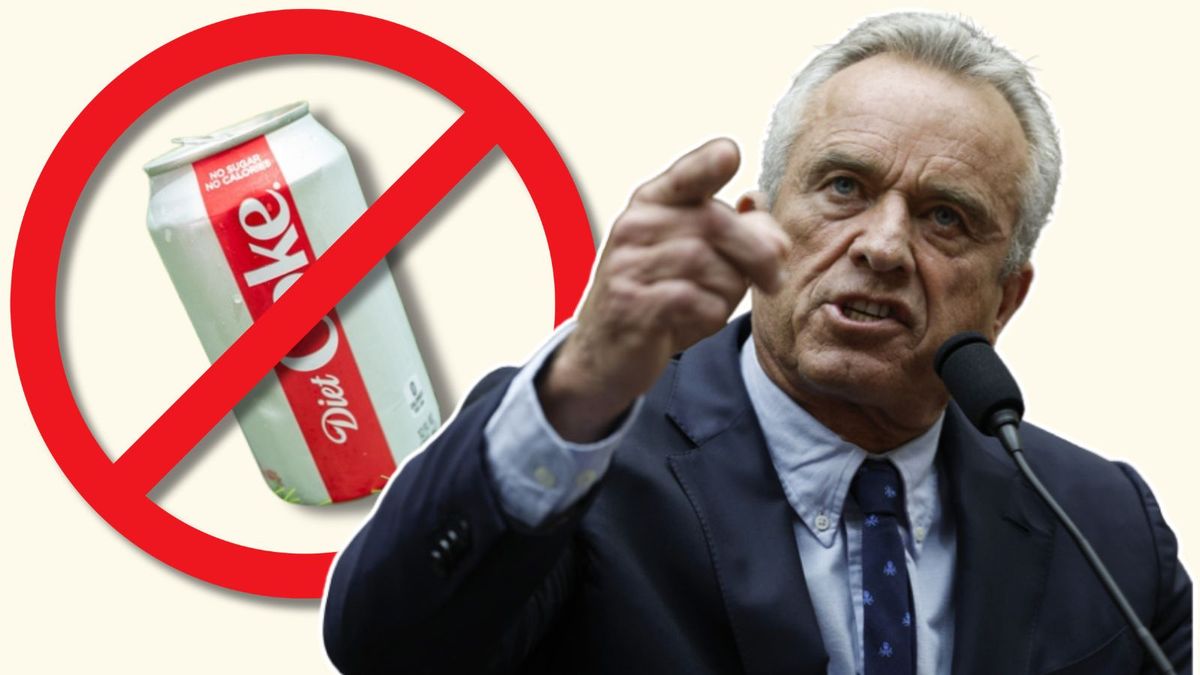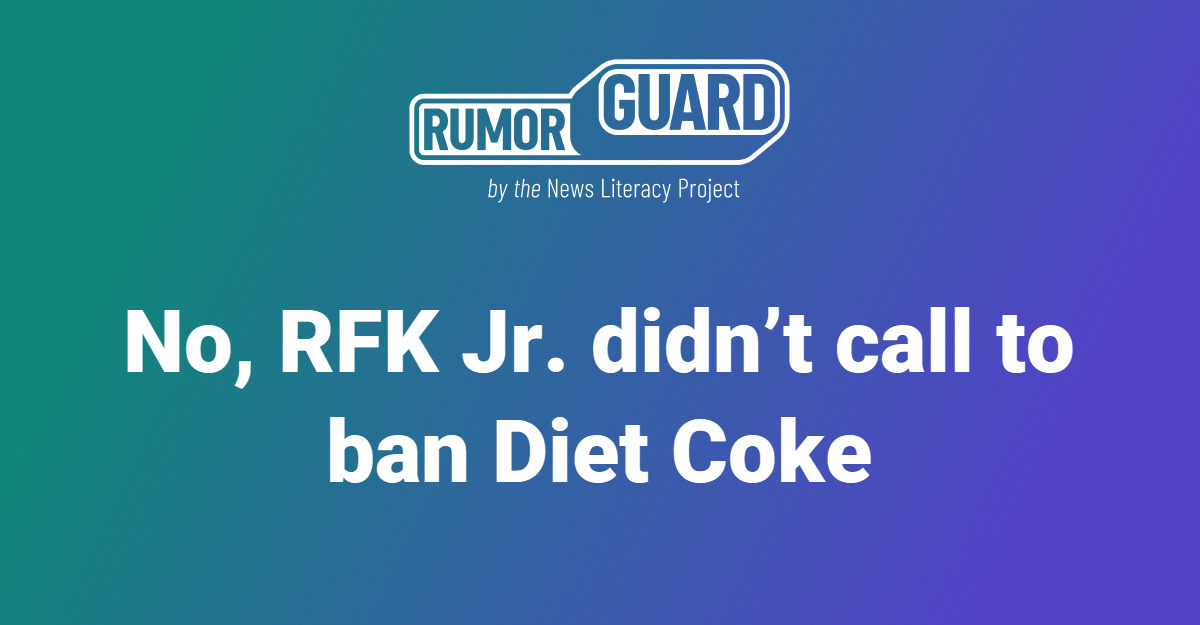RFK Jr Ban Diet Coke: A Comprehensive Analysis Of The Controversy
The controversy surrounding RFK Jr's stance on Diet Coke has sparked intense debates and discussions worldwide. As a prominent environmental activist and public figure, Robert F. Kennedy Jr.'s opinion carries significant weight, influencing public perception and policy discussions. This article aims to provide a detailed examination of the topic, exploring the reasons behind the ban, its implications, and the broader context of artificial sweeteners in beverages.
Understanding the rationale behind RFK Jr.'s call for banning Diet Coke requires a deeper dive into the science of artificial sweeteners, their health effects, and the role of corporate responsibility in public health. This issue is not merely about one beverage; it touches on larger concerns about consumer safety and corporate transparency.
This article will explore various aspects of the controversy, including scientific studies, expert opinions, and potential policy changes. By the end, readers will have a comprehensive understanding of the debate and its implications for public health and corporate responsibility.
Read also:Adderall And Zyn Exploring The Synergy And Risks
Table of Contents
- Biography of RFK Jr.
- Reasons Behind the Ban
- Scientific Evidence Against Artificial Sweeteners
- Health Concerns Associated with Diet Coke
- Corporate Responsibility in Beverage Production
- Policy Implications of the Ban
- Increasing Consumer Awareness
- Exploring Healthy Alternatives
- A Global Perspective on Beverage Regulations
- Conclusion and Call to Action
Biography of RFK Jr.
Background and Achievements
Robert F. Kennedy Jr., commonly referred to as RFK Jr., is a renowned environmental lawyer and activist. He has dedicated much of his career to advocating for environmental justice and corporate accountability. RFK Jr. is the president of the Waterkeeper Alliance, an organization that fights for the protection of waterways and aquatic life.
Below is a table summarizing key details of RFK Jr.'s life and career:
| Full Name | Robert Francis Kennedy Jr. |
|---|---|
| Birthdate | February 17, 1954 |
| Profession | Environmental Lawyer, Activist |
| Notable Achievements | President of Waterkeeper Alliance, Author of several books on environmental issues |
Reasons Behind the Ban
RFK Jr's Stance on Artificial Sweeteners
RFK Jr.'s call for banning Diet Coke is rooted in his concerns about the health implications of artificial sweeteners, particularly aspartame. Aspartame, the primary sweetener in Diet Coke, has been the subject of numerous studies and debates over its safety. RFK Jr. argues that the beverage industry has not done enough to ensure consumer safety, leading to a call for stricter regulations.
Key reasons for the ban include:
- Potential health risks associated with long-term consumption of artificial sweeteners
- Lack of transparency in corporate studies and research
- Concerns about the impact of artificial sweeteners on vulnerable populations, such as children and pregnant women
Scientific Evidence Against Artificial Sweeteners
Scientific research plays a crucial role in understanding the potential risks associated with artificial sweeteners. Studies have raised concerns about the effects of aspartame on metabolic health, brain function, and overall well-being. According to a study published in the Journal of the American Medical Association, long-term consumption of artificial sweeteners may be linked to an increased risk of metabolic syndrome and cardiovascular disease.
Additionally, research from the European Food Safety Authority highlights the need for further investigation into the safety of aspartame, particularly in high doses. These findings support RFK Jr.'s concerns about the lack of comprehensive research and the need for stricter regulations.
Read also:Scott Manville The Inspiring Journey Of A Visionary Entrepreneur
Health Concerns Associated with Diet Coke
Potential Risks of Artificial Sweeteners
Consumers often choose Diet Coke as a healthier alternative to regular soda, assuming it reduces calorie intake. However, studies suggest that artificial sweeteners may have unintended consequences on health. Some potential risks include:
- Increased risk of obesity and metabolic disorders
- Impact on gut microbiota, potentially affecting digestion and immune function
- Neurological effects, such as headaches and mood disturbances
These health concerns underscore the importance of re-evaluating the safety of artificial sweeteners and considering alternative options for consumers.
Corporate Responsibility in Beverage Production
The beverage industry has a responsibility to prioritize consumer health and safety. However, critics argue that companies often prioritize profits over public well-being. RFK Jr. emphasizes the need for greater transparency in research and labeling practices, ensuring consumers have access to accurate information about the products they consume.
Corporate responsibility extends beyond product safety to include sustainable production practices and ethical marketing. Companies must take proactive steps to address consumer concerns and promote healthier beverage options.
Policy Implications of the Ban
Potential Regulatory Changes
RFK Jr.'s call for banning Diet Coke could lead to significant policy changes in the beverage industry. Governments and regulatory bodies may consider implementing stricter regulations on artificial sweeteners, requiring more comprehensive safety testing and transparent labeling. These changes could have far-reaching implications for both producers and consumers.
Potential policy implications include:
- Stricter safety standards for artificial sweeteners
- Improved labeling requirements to inform consumers about potential risks
- Increased funding for independent research on artificial sweeteners
Increasing Consumer Awareness
Empowering consumers with knowledge is essential in addressing the concerns surrounding artificial sweeteners. Educating the public about the potential risks and benefits of different sweeteners can help individuals make informed choices about their dietary habits. Consumer advocacy groups and public health organizations play a vital role in raising awareness and promoting healthier alternatives.
Exploring Healthy Alternatives
Natural Sweeteners and Their Benefits
For those seeking alternatives to artificial sweeteners, several natural options are available. These include stevia, monk fruit, and erythritol, which offer sweetness without the potential health risks associated with aspartame. Natural sweeteners are increasingly popular among health-conscious consumers, providing a viable alternative to traditional sugar substitutes.
Benefits of natural sweeteners include:
- Lower calorie content compared to sugar
- Minimal impact on blood sugar levels
- Rich in antioxidants and other beneficial compounds
A Global Perspective on Beverage Regulations
The debate over artificial sweeteners is not unique to the United States; it is a global issue with varying regulatory approaches. Countries such as France and Canada have implemented stricter regulations on artificial sweeteners, while others continue to rely on industry-funded research to guide policy decisions. Understanding these differences can provide valuable insights into effective regulatory strategies.
Conclusion and Call to Action
In conclusion, RFK Jr.'s call for banning Diet Coke highlights important concerns about consumer safety and corporate responsibility in the beverage industry. The potential health risks associated with artificial sweeteners, combined with the need for greater transparency and accountability, make this issue a critical topic for public discussion. By increasing consumer awareness and advocating for policy changes, we can promote healthier beverage options and protect public health.
We invite readers to share their thoughts and experiences in the comments section below. Additionally, consider exploring other articles on our site to learn more about related topics. Together, we can make informed choices that benefit both individual health and the environment.
Kemono Vinarchia: A Comprehensive Guide To The Fascinating Character
Understanding The Meaning And Impact Of "Str8 Suck"
RFK Jr Ban Diet Coke: A Comprehensive Analysis Of The Controversy

No, RFK Jr. Is Not Banning Diet Coke

No, RFK Jr. didn’t call to ban Diet Coke

Fact Check X post about RFK Jr ban on Diet Coke came from parody